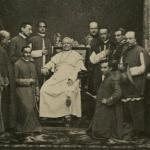At the beginning of this week, John Fea posted several key races in state and federal contests where evangelicals were either running for office or where evangelical voters would be decisive in the outcome. Here are the races he pinpointed with the outcome:
In Texas, there is some anecdotal evidence that some white evangelical women might vote for Beto O’Rourke in the state’s U.S. Senate race. But this is just anecdotal evidence. Most white evangelical women will vote for Ted Cruz. Nevertheless, if enough white evangelicals break from Cruz and vote for Beto (even if the number is small), it could be enough to get Beto over the top in a very close race.
“Robert” (to avoid cultural appropriation) lost.
If Josh Hawley defeats Claire McCaskell in the Missouri Senate race, it will be because white evangelicals backed Hawley, an attender of an Evangelical Presbyterian congregation. I should add that pseudo Christian Right historian David Barton played a role in this campaign.
Hawley won.
In Tennessee, Marsha Blackburn is getting most of the evangelical vote in a tight U.S. Senate race. Blackburn is a member of Presbyterian Church of America congregation in Nashville.
Blackburn won.
If Scott Walker wins another term gubernatorial term in Wisconsin, it will be because white evangelicals rallied to his side.
Walker lost.
In Virginia’s 7th congressional district, incumbent David Brat, a Hope College and Princeton Theological Seminary graduate with a Ph.D. in economics from American University, is going to need white libertarian evangelicals to help him hold off Abigail Spanberger.
Brat lost.
In North Carolina’s 13th congressional district, incumbent Ted Budd is getting a strong challenge from Kathy Manning. Budd is a graduate of Dallas Theological Seminary and attends Twin City Bible Church in Winston-Salem. (In February 2018, Budd introduced a resolution in Congress to honor Billy Graham).
Budd won.
In North Carolina’s 9th district, an open seat, Mark Harris, a Southern Baptist clergyman, graduate of Southeastern Baptist Theological Seminary, and employee of Campus Crusade for Christ, is running against Democrat Dan McCready, a former U.S. Marine and Eagle Scout. McCready is also a man of deep Christian faith who claims that he was “baptized in the water of the Euphrates River” during his military service in Iraq. The race is a toss-up.
Harris won.
In the Florida governor’s race, Democrat Andrew Gillum has an evangelical running-mate. Chris King attends an Evangelical Presbyterian Church, was active in the Fellowship of Christian Athletes, was a member of Campus Crusade for Christ at Harvard, and once worked for progressive evangelical Jim Wallis. (We covered him here).
Gillum lost.
Not all of these candidates were evangelical. Some were simply races where scholars believed faith would matter, either as a factor at the ballot box or in the candidate’s profile.
The lesson seems to be that evangelicalism, when relevant, matters more in the South. In North Carolina and Tennessee evangelical candidates won. In Florida and Texas evangelicals likely voted Republican, notwithstanding an evangelical running-mate in Florida (no coattail effect, please). In Virginia, which is increasingly part of the Northeast, and in Wisconsin, evangelicals are likely in the minority and so not capable of shaping the outcome on their own.
Now if only people who studied evangelicals and politics would pay attention to the sorts of factors that influence politics — economics, taxes, war, charisma, national interest. It is not like the Bible has much to say about those policies or as if evangelicals have much experience with creating policy.












